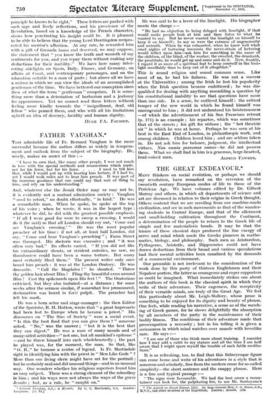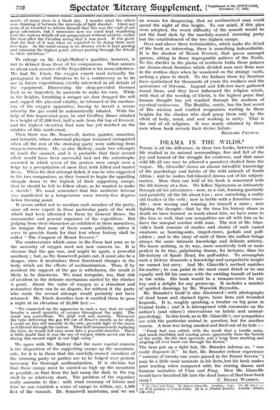THE GREAT ENDEAVOUR.*
MANY thinkers on social evolution, or perhaps we should say revolution, have remarked on the reversion of the twentieth century European modes of life to those of the Periclean Age. We have volumes edited by Dr. Gilbert Murray and others, in which all departments of science and art are discussed in relation to their origins in Greek thought. Others contend that we are recoiling from our machine-made civilization, and see in such movements as that of the wander- ing students in Central Europe, and that of the allotment and small-holding cultivation throughout the Continent, a determination of the people to return to the Greek life of simple and few materialistic bonds. It may be that the leisure of those classical days produced the fine energy of nerve and mind which made the Greeks pioneers in mathe- matics, biology, and philosophy. Such men as Aristarchus, Pythagoras, Aristotle, and Hippocrates could not have drawn deductions from their broad and various speculations had their mental activities been canalized by the demands of a commercial environment.
Our preamble is not irrelevant to the consideration of the work done by this party of thirteen Englishmen and their Nepalese porters, the latter as courageous and eager supporters as could be imagined. What immediately strikes one about the authors of this book is the classical spirit in which they write of their adventure. Their eagerness, the receptivity of their versatile minds, are truly of the Great Age. We feel this particularly about Mr. Leigh-Mallory, whose prose is something to be enjoyed for its dignity and beauty of phrase, One feels, while reading his narrative, a sense as of the watch- ing of Greek games, for he shows delightfully the absorption by all members of the party in the maintenance of their bodily fitness. The conditions of their adventure made that preoccupation a necessity ; but in his telling it is given a seriousness in which mind watches over muscle with loverlike care. He says :—
" I am one of those who think more about training. I consider how I may add a cubit to my stature and all the time I am half aware that I might spare myself the trouble of such futile medita- tions."
It is so refreshing, too, to find that this Sidneyesque figure. can come home and write of his adventures in a style that is sonorous and scholarly, free from the modem craze for so-called simplicity—the short sentence and the snappy phrase. Here
is a fine and typical passage :—
"The signs were favourable. We had the best omen a motm- taineer can look for, the palpitating fire, to use Mr. Santayana's • The Assault on Mount Eared, 1922. By Brig.-General Mon. C. G. Bruce, C.D., 31,T.O., and other members ot the Expedition. London; Arnold. 125a
words, of many stars in a black sky. I wonder what the others were thinking of between the intervals of light slumber. I dare say none of us troubled to inform himself that this was the vigil of our great adventure, but I remember how my mind kept wandering over the various details of our preparations without anxiety, rather like God after the Creation seeing that it was good. It was good. And the best of it was what we expected to be doing the next two days. As the mind swung in its dreamy circle it kept parsing and repassing the highest point, always passing through the details to their intention."
To enlarge on Mr. Leigh-Mallory's qualities, however, is not to detract from those of his companions. What amazes us about each member of the Expedition is his manysidedness. We find Mr. Finch, the oxygen expert (and naturally the protagonist in what threatens to be a controversy as to its use in future expeditions), vividly interested in all details of the equipment. Discovering the shop-provided thermos flask to be imperfect, he proceeds to make his own. While in the heights, breathing a meagre air that drugged the will and sapped the physical vitality, he laboured at the mechan- ism of his oxygen apparatus, having to invent a means whereby the gas could be automatically inhaled. With the help of this improvised gear, he and Geoffrey Bruce climbed to a height of 27,300 feet, half a mile from the top of Everest, and the highest elevation that man has yet reached on the crinkles Of this earth-crust.
Then there was Mr. Somervell, doctor, painter, musician, and botanist, whose abnormal physique remained unimpaired when all the rest of the storming party were suffering from oxygen-starvation. He, as also Mallory, made two attempts to reach the summit, and it is probable that their second effort would have been successful had not the catastrophe occurred in which seven of the porters were swept over a ledge by a precipitation of snow that both killed and buried them. When the first attempt failed, it was he who suggested to his two companions, as they turned to begin the appalling struggle down to the highest of their supporting camps, that he should be left to follow alone, as he wanted to make a sketch ! We must remember that this aesthetic fervour
was manifested in a temperature some twenty-five degrees below freezing point.
It seems unfair not to mention each member of the party, since all were expert in those particular parts of the work which had been allocated to them by General Bruce, the commander and general organizer of the expedition.. But
judging from their characters as exhibited in these narratives, we imagine that none of them courts publicity, unless it serve to provide funds for that feat whose history shall be called "The Conquest of Mount Everest."
The controversies which arose in the Press last year as to the necessity of oxygen need not now concern us. It is
obvious that the gas was, and might be again, a powerful auxiliary ; but, as Dr. Somervell points out, it must also be a danger, since it neutralizes those functional changes in the body which are the effects of acclimatization. Thus, if by accident the support of the gas is withdrawn, the result is likely to be disastrous. We must recognize, too, that risk of accident to the delicate mechanism carried by the climber is great. About the value of oxygen as a stimulant and restorative there can be no dispute, for without it the party who made the second attempt would probably not have returned. Mr. Finch describes how it enabled them to pass a night at an elevation of 25,500 feet :— " We connected up the apparatus in such a way that we could breathe a small quantity of oxygen throughout the night. The result was marvellous. We slept well and warmly. Whenever the tube delivering the gas fell out of Bruce's mouth as he slept, I could see him stir uneasily in the uric, greenish light of the moon as it filtered through the canvas. Then half unconsciously replacing the tube, he would fall once more into a peaceful slumber. There is little doubt that it was the use of oxygen which saved our lives during this second night in our high camp."
We agree with Mr. Mallory that the more capital concern is the disposition of the supporting camps up the mountain- side, for it is in them that the carefully-nursed members of the storming party or parties are to be lodged over periods necessary for thorough acclimatization. It is obvious too that these camps must be carried as high up the mountain as possible, so that from the last camp the dash to the top shall be as relatively short. The problem of the organizer really amounts to this : with what economy of labour and time he can establish a series of camps to within, say, 1,500 feet of the summit. Dr. Somervell maintains, and we see no reason for disagreeing, that an acclimatized man could spend the night at this height. To. our mind, if this plan were adopted, the worst difficulty of the assault would be not the final dash by the carefully-nursed storming party but the establishment of the two highest camps.
Over and above these technicalities, which make the detail of the book so interesting, there is something indescribable. It is the shadow of Mount Everest, that queen amongst queens, sitting in those impregnable palaces of the North. To the dweller in the plains of northern India those palaces are dream-cloud frontiers which divided man race from race in the restless days when he wandered on the strange earth, seeking a place to dwell. To the Indians those icy frontiers have symbolized for thousands of years the coolness and the quiescence of Nirvana. Legend and folk-lore have gathered round them, and they have influenced the religion which, with that of the worship of Christ, is the highest point that human thought has yet reached through the medium of mystical endeavour. The Buddha, surely, has the last secret of His wisdom and exalted resignation waiting in those heights for the climber who shall grasp them only by the effort of body, mind, and soul working in unity. That is the end of lall religions. It was nearly attained by these men whose book records their divine failure.
RICHARD CIIURCIL



























































 Previous page
Previous page